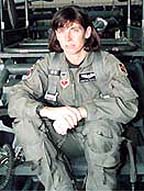|
McSally's
Story
|
|||
 |
Lt. Col. Martha McSally is a woman who stood up for what she believed in. McSally was rasied in Warwick, Rhode Island, and was the youngest of five sibilings. Her father died when she was twelve, and from there her mother was an exceptional role model. When it came time for college she applied to the U.S. Air Force Academy in Colorado Springs. Though naive about military life, McSally liked the concept of trading free education for service to her country. Though at the time she didn't expect to be flying fighter jets, but after going on "incentive flights", McSally changed career plans her freshman year. There was only one problem, women were prohibited from flying combat aircrafts and McSally was only 5 foot 3 inches, an inch too short to fly any other support aircrafts. After two years of lobbying the head doctor at the academy, McSally was the only cadet to receive an exemption her senior year. In 1995, she was sent to Kuwait for her first deployment where she flew A-10 missions over Iraq. Shortly after her arrival, McSally read about the abaya policy in a military newspaper for Americans in the Middle East. There was also a picture of a young enlisted woman in Saudi Arabia wearing the head-to -toe black outfit. Immediatly outraged, she contacted the Joint Task Force Southwest Asia, but it would be four years before she learned the truth about where the policy originated. |
||
|
In 1999, while attending a
prestigious legislative fellowship in Washington, D.C., McSally mentioned
the abaya policy and her objections to Congressional staffers at Capital
Hill. Finally, after a colleague sent a formal inquiry to the State
Department and that the local commander in the region had the discretion
to enforce or rescind it. After her fellowship ended, McSally was tapped
to direct search-and-rescue missions over Iraq. The only setback was
that she would be stationed in Saudi Arabia. McSally immediately phoned
the local commander who would be her boss. McSally felt that by forcing
her to conform to the abaya policy, they were violating her right to
freedom of religion. During an interview McSally stated, "I am
a Christian American soldier, not a Muslim Saudi woman." Though
the commander had her convinced he would rescind the policy for her,
his chief of staff and a military lawyer e-mailed her informing her
otherwise. They declared the abaya policy a "lawful order"
and threatened her with a court-martial if she disobeyed.
|
 |
||
 |
At the end of her rope, McSally agreed to the policy, but only as a way to assist in changing the policy. By going along with what the Air Force wanted she was proving that she wasn't a troublemaker. However, McSally also stated in her interview that the policy struck her as being ludicrous because the Air Force would let her go up alone in a single engine fighter jet over enemy territory, but they wouldn't let her sit in the front seat of a car on a Saudi street. While stationed in Saudi Arabia, rather than violate the policy, McSally decided not to leave base. By this time McSally knew the only way the policy was going to be changed was by going public. She knew that going public would put her job in jeopardy, but she saw no reform unless she took her case to the widest audience possible. After her story ran on the cover of USA Today her commanding officer agreed to review the policy. While the issue pressed on, a man named John Whitehead, founder of the Rutherford Institute of Charlottesville, Virginia, the civil liberties organization that represented Paula Jones in her suit against President Clinton, offered free legal assistance if she wanted to sue the government. At first she declined, but after waiting several months and getting no straight answers, McSally agreed to have the Institute draft a copy of a lawsuit.
|
||




